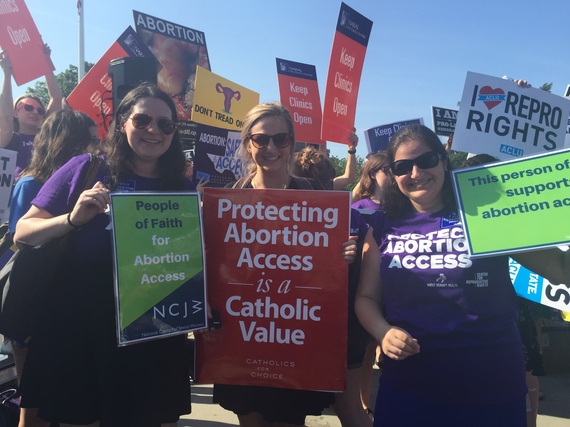By Marie Alford-Harkey and Nancy K. Kaufman
Three weeks ago, the nation's highest court handed down its decision in Whole Woman's Health v. Hellerstedt, a landmark case on abortion access -- overturning Texas restrictions that denied access to abortion to millions of women. The decision is a huge victory for women, but it likely won't end the debate on abortion itself. But, what do these well-worn cycles of debate miss?
So far that debate has mostly ignored the voices of people of faith who support a woman's right to make her own decisions about her body and her health, based on her own religious and moral beliefs, and what is best for her and her family. Indeed, our conversations too often ignore the diversity of religious beliefs about abortion.
From the compassionate spiritual care of chaplains at abortion clinics to the millions of lay people working to end abortion stigma, religious support goes largely unnoticed. This contributes to a widely held misconception that all people of faith and religious leaders oppose abortion access. As abortion provider Dr. Willie Parker observes in the documentary Trapped, "There are people who feel like having a faith identity and providing abortion care are mutually exclusive." Nothing could be further from the truth.
As leaders of national faith-based organizations, we represent a largely overlooked contingent of people who support access to abortion because of -- not in spite of -- our faith. We believe that making moral decisions is a sacred responsibility and that we are called to make our own decisions, not to allow others to make them for us. Each of us deserves this respect and freedom. As individuals, our faith also calls us to care for and steward our own bodies, which we believe are gifts from God.
Therefore, we believe that reproductive decisions -- including decisions about having an abortion -- belong to the individual. Rooted in this belief, we respect every individual's bodily autonomy. We respect the needs and experiences of the many, many women who have had an abortion (1 in 3 under 45 have done so according to Guttmacher Institute) and seek to undo unjust barriers to abortion caused by social and economic inequities.
Our religiously grounded commitment to justice calls us to fight for safe, legal abortion care because we know that lack of access leads to further injustice. Those most affected by abortion restrictions are women of color, immigrants, young women, women struggling to make ends meet, and those who are lesbian, gay, bisexual, transgender or queer (LGBTQ). This reproductive oppression -- like every other kind of oppression -- contradicts our faith.
We support abortion access because compassion demands it. When a woman makes the personal decision to seek abortion, it is our moral obligation to ensure she has access to safe medical care. Denying access jeopardizes women's health. Research from the Texas Policy Evaluation Project shows that when abortion is pushed out of reach, some women will find a safe way to end a pregnancy while others may resort to methods that range from ineffective to downright dangerous.
The Texas case brought together people of faith in support of abortion access like never before. As we celebrate this important decision for women's health, rights, and dignity, we recommit ourselves to a world that embodies these ideals for all people. Even with this victory, we must continue making clear that full healthcare for women includes access to abortion and that abortion access is a moral imperative.
We can do that now in practical terms by urging Congress to pass the Women's Health Protection Act -- federal legislation that would take steps to protect the availability of safe, legal abortion nationwide by barring states from imposing arbitrary, medically unnecessary restrictions on clinics, providers, and women seeking abortion care (like those struck down in Texas). People of faith who support abortion access must speak out in our local communities and congregations. We must remind lawmakers that there are a variety of religious positions on this issue. Safeguarding access avoids imposing one religious view on everyone.
As our country engages in yet another round of conversations on abortion and the moral implications of this Supreme Court decision, we will continue to lift up our voices in faith communities and society. We are people of faith who support full healthcare for women. We are people of faith who support access to abortion. We are not going anywhere, we will not stay silent, and we will not stop fighting for justice.
___________
Marie Alford-Harkey is president and CEO of the Religious Institute, a national multi-faith organization dedicated to advocating for sexual health, education, and justice in faith communities and society.
Nancy K. Kaufman is CEO of the National Council of Jewish Women, a grassroots organization inspired by Jewish values that strives to advance social and economic justice for women, children, and families.

